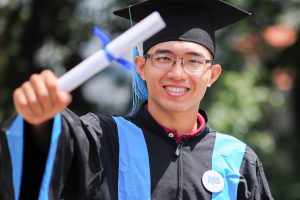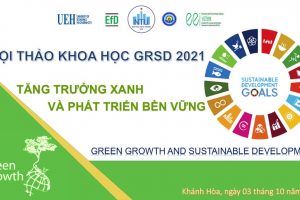[STBI-21-01-2016] Self-enforcing Intergenerational social contract as a source of Pareto improvement and Emission mitigation
by Dr. Nguyen Thang Dao
11:00 am, Thursday, 21-01-2016
Hall H.001, UEH School of Economics
Abstract
We consider, in a general equilibrium overlapping generations (OLG) model with environmental externalities, a contract between successive generations, whereby agents of the current working- age generation privately invest a share of their labor income in pollution mitigation in exchange for a transfer to their old-age capital income paid by the next generation. We show that the existence of a contract which is Pareto-improving compared to an equilibrium without contract requires a minimum level of income and we characterize the set of Pareto-improving mitigation-transfer combinations as well as the Pareto frontier. Nash bargaining yields unique solutions for the mitigation share and transfer rate respectively which increase in income. We prove that Nash bargaining leads to a steady state with lower emission stock and higher income compared to the steady state without a contract and we study transitional dynamics. Notably, simulation shows that delaying the implementation of a social contract for too long may have considerable welfare costs: Income inevitably falls below the threshold in nite time so that Pareto improving mitigation is no longer possible and the economy converges to a steady state with high emission stock and low income. In the second part of the paper, we study a non-cooperative setting, taking into account that credibly committing to a contract might not be possible. We show that there exist mitigation transfer schemes which are both Pareto improving and give no generation an incentive to deviate from the provisions of the contract. Incentive compatible Nash bargaining leads to a lower mitigation investment and transfer than bargaining in the cooperative setting.
Presenter
Dr. Nguyen Thang Dao is working for Mercator Research Institute on Global Commons and Climate Change (MCC) in Berlin, Germany as a research fellow. Dr. Dao completed his Ph.D in Economics in September 2013 at CORE, Université catholique de Louvain. His fields of research cover Growth Theories, Climate Change, Environmental Economics, Comparative Development, and Public Economics which are studied in micro-foundation macroeconomic models. Dr. Dao has published his research studies on academic journals such as Cliometrica: Journal of Historical Economics and Econometric History, Journal of Public Economic Theory, Economics Letters, and Journal of Science: Economics and Business.


